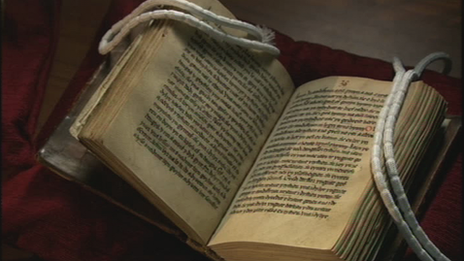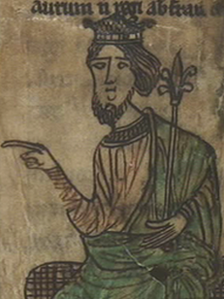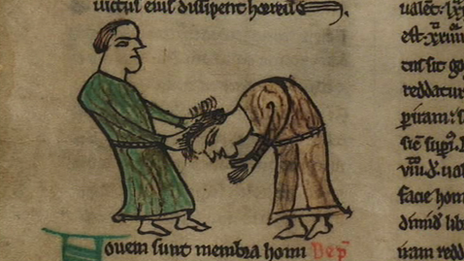The Story of Wales: Dr Sara Elin Roberts on Hywel Dda's laws
- Published

The laws are set down in forty 13th century manuscripts written in Latin and medieval Welsh
If you imagined compensation culture was a peculiarly modern idea, think again.
The idea of claiming damages for injuries received was a central thread running through the laws of a king who ruled over most of Wales some 1,000 years ago.
By about AD942 Hywel Dda (Hywel the Good) reigned over an area of Wales stretching from Prestatyn in the north to Pembroke in the south.
A descendant of the early Welsh king Rhodri Mawr (Rhodri the Great), his legacy was a set of laws which lasted until the mid-1500s.
As modern day legal historian Dr Sara Elin Roberts explains in episode two of BBC Wales' landmark history series The Story of Wales, the laws reflect the perhaps unexpected sophistication of early Welsh society.
And, as she explains off-camera, seen from a distance of many centuries after they were drafted they are also on occasion delightfully quirky.
The laws set the value of a lawyer's tongue, lay down a person's right to compensation in the event that they are sold a dodgy ox, and outline the punishment a woman might expect for hiding her lack of chastity from her husband-to-be.
'Very modern'
Dr Roberts has spent much of her career studying 13th Century copies of the laws, which are set down in a mixture of Latin and medieval Welsh in around 40 manuscripts housed at the National Library of Wales in Aberystwyth.
"They deal with the king, they deal with peasants and their rights - people's rights - injury, compensation for injury, homicide, theft, arson. You name it," she said.
Dr Roberts describes them as very modern in their attitude to crime and punishment.
"You often hear the term compensation culture these days. Well, this is what you have in medieval Wales.
"Rather than physical punishments - whipping, hanging, eye-for-an-eye and all of that, what you have is compensation.

The king himself is portrayed in the manuscripts
"The laws set down tariffs, identifying the value of everyone's life, in the event that they were killed. This varied according to where you were in society."
After a homicide, Dr Roberts explained, the killer and all of his family up to the third or fourth cousin had to pay compensation to the victim's family, up to and including the fourth cousin.
"There was only one instance of capital punishment in Welsh law," says Dr Roberts. "For persistent serious theft you could be hanged, but this was used as a last resort."
In terms of women's rights the laws were, in some ways, quite advanced, says Dr Roberts.
In medieval Wales the first seven years of marriage was regarded as a trial period. After seven years, a couple could separate quite freely and their goods would be split on a 50:50 basis, with the laws laying down who got what.
Responsibility
"Women did appear to have more independence than they would in other countries," says Dr Roberts. "They wouldn't be left destitute, they would get something if it didn't work out."
Underpinning Hywel Dda's laws, she said, was the idea that a person should take responsibility for their actions.
"If you were chopping down a tree you had to tell people you were doing it. If a tree falls on someone and they have been warned then that's their fault. If they haven't been warned you have to pay full compensation.
"It's like health and safety gone mad."
While they cover issues clearly deemed serious at the time, Dr Roberts is the first to acknowledge the quirky side of Hywel Dda's laws.
"If you look at the law text in a vacuum you are likely to find something that will make you laugh," she says.
"A lawyer's tongue was worth a fortune as it was the symbol of their office. Theirs was a speaking role. There was a price of around 100 cows on it."

The illustrated manuscripts are housed at the National Library of Wales in Aberystwyth
Many of the laws concerned animals - after land, the second most expensive item one could own.
"The laws identified the value of wild and tame animals, and gives a description of each animal and what that animal was supposed to be able to do.
'Caterwauling'
"With an ox, for example, it was expected to pull straight when ploughing a field and not get tired.
"There was an approximate value for compensation so, if someone sold you an ox, they guaranteed that it would plough straight. If you bought a dud ox, you got compensation.
"A cat was supposed to have sharp claws, be an excellent mouse catcher, not eat its own kittens and wasn't supposed to go caterwauling during a full moon, keeping your neighbours awake."
And the penalty to be paid by the non-virgin bride?
"She gets taken outside, they cut her clothes off so that she is naked from the waist down and is given a young horse with a greased tail," explains Dr Roberts.
"If she can hold the horse by his tail she gets to keep it. If not, she gets nothing, as her family would not want her back."
The second part of The Story of Wales: Power Struggles can be seen on Thursday, 1 March on BBC One Wales at 21:00 GMT. The other episodes will be on subsequent Mondays.
- Published27 February 2012
- Published19 January 2012